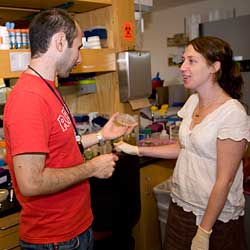Stuart Lab
 The overall interest of the Stuart Laboratory is to understand the innate immune system and the cell biology of phagocytosis. Phagocytosis is an evolutionarily conserved process required for tissue remodelling and host defense (Stuart and Ezekowitz, 2005). During phagocytosis, particles are recognised by cell surface receptors that trigger rearrangement of the actin-cytoskeleton and internalization of the bound particle into a de novo, membrane-limited organelle known as the phagosome. From within the phagosome many of the innate and adaptive immune functions associated with phagocytosis are initiated. Phagocytosis is an essential component of defense against the infectious diseases that represents a major burden on healthcare resources both in the developing and developed world. In addition, concerns that infectious agents may be used in bioterrorism have further increased the need for us to understand defense mechanisms used to combat invading organisms. Our ultimate aim is to obtain a detailed understanding of phagocytosis that will provide insights into the role of phagocytes in remodeling inflamed tissue and in the innate and adaptive immune responses required to contain pathogens. The overall interest of the Stuart Laboratory is to understand the innate immune system and the cell biology of phagocytosis. Phagocytosis is an evolutionarily conserved process required for tissue remodelling and host defense (Stuart and Ezekowitz, 2005). During phagocytosis, particles are recognised by cell surface receptors that trigger rearrangement of the actin-cytoskeleton and internalization of the bound particle into a de novo, membrane-limited organelle known as the phagosome. From within the phagosome many of the innate and adaptive immune functions associated with phagocytosis are initiated. Phagocytosis is an essential component of defense against the infectious diseases that represents a major burden on healthcare resources both in the developing and developed world. In addition, concerns that infectious agents may be used in bioterrorism have further increased the need for us to understand defense mechanisms used to combat invading organisms. Our ultimate aim is to obtain a detailed understanding of phagocytosis that will provide insights into the role of phagocytes in remodeling inflamed tissue and in the innate and adaptive immune responses required to contain pathogens.
We use a variety of systems-based approaches such as proteomics, RNAi, computational analysis, and knockout animals, and we move freely between model organisms and mammalian systems, allowing rapid transition from gene discovery to function. The Stuart laboratory is also one of the five independent, interdisciplinary, collaborative laboratories that makes up the Program of Developmental Immunology in the Department of Pediatrics at Massachusetts General Hospital/Harvard Medical School.
The major collaborators of the Stuart Lab are:
|

